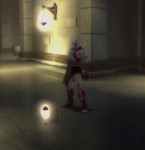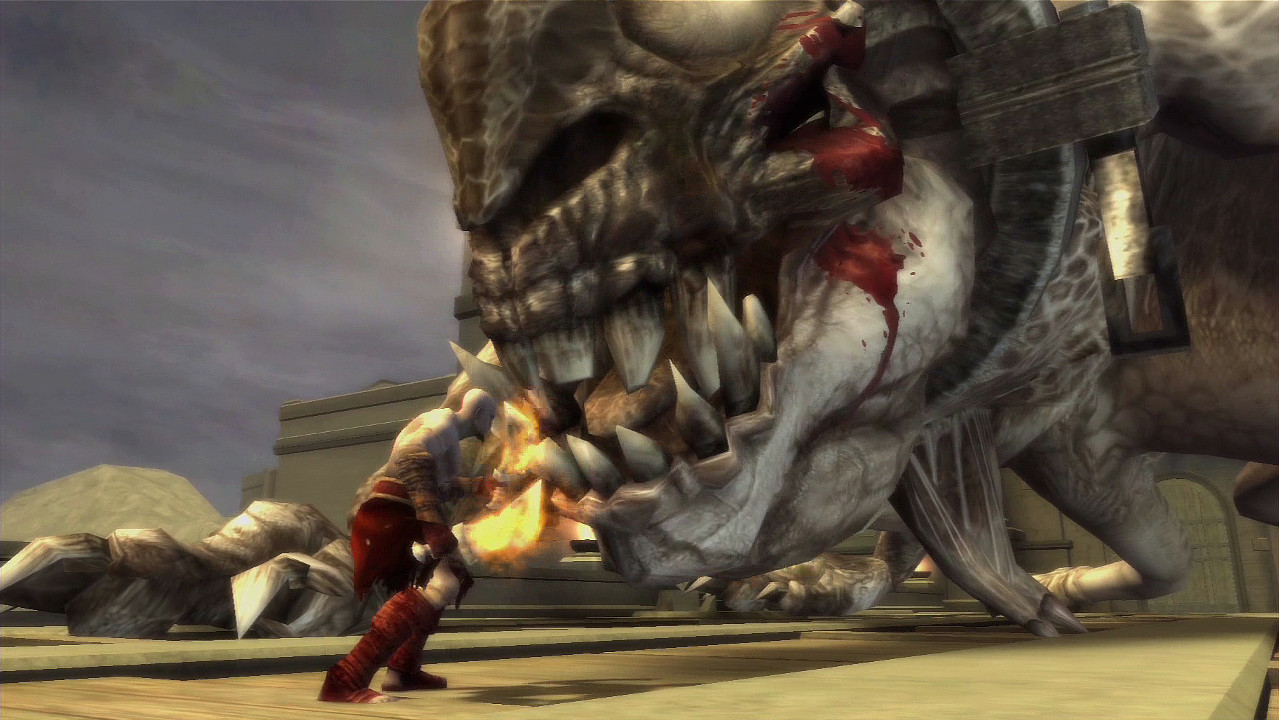The original God of War was an instant classic. Naturally, when people are done with instant classics, they crave more of the same. And so, God of War II was born. God of War II was also an instant classic, which left the door open for even more of the same. At the time, Sony was trying to sell the PlayStation Portable to consumers, and was in need for games to draw attention to it. A developer noticed this, along with the fact that someone left the God of War door ajar. After a successful pitch meeting and several months of development, God of War: Chains of Olympus was released for consumption. Was it critically acclaimed? Sure. Was it an instant classic? Eghghh.
God of War is a series known for its gratuitous violence. It’s strangely fitting, then, that this game would seemingly attempt to embody that. I’m not just referring to the violence; there’s plenty of blood all over the place, but the key word here is “gratuitous”. Chains of Olympus seems to embody gratuitousness itself. Things occur in the game for no reason. Nothing new is introduced into the gameplay. When the rest of the series is taken into account, the events of Chains of Olympus have no real significance. This is tantamount to filler, and the game doesn’t need to exist.

The protagonist of the God of War series is Kratos, the perpetually angry Spartan warrior. Kratos has only three character traits: angry, brooding, and tortured. Each of his social interactions sound like he’s at a restaurant, trying to talk over the obnoxious couple in the adjacent booth. To do an impersonation of Kratos, you must tense all of your neck muscles, try as hard as you can to touch your chin to your sinuses, and shout everything you say with all of your throat. He’s the kind of person you’d expect to run around, murdering nearly everything he sees. You wouldn’t exactly call him a hero. In fact, the events of God of War II literally made him into an anti-hero. The story of Kratos is a tragic one, wrought with pain and loss, making him an inhuman monster that we’re evidently supposed to sympathize with.

Kratos’s back story was divulged in the first God of War, but Chains of Olympus seeks to remind us of his past, instead of establishing a story of its own. Here’s a brief recap: Kratos was once the commander of the Spartan army. On the verge of defeat, he plead to Ares, the God of War, to defeat his enemies. Ares answered his plea, killed his enemies, and made him into a personal servant. Kratos ran around, fighting wars for Ares, and he basically murdered everything he saw. One day, he murdered his own wife and child in a fit of bloodlust. Kratos now wears their ashes all over his skin as a reminder of what he did, which would forever haunt him. He immediately broke his ties with Ares. In a quest for repentance, Kratos made a deal with the goddess Athena. He would serve the Gods, with the promise that they would eventually forgive him for all the murdering. Basically, Kratos is performing community service. For some reason, this service also involves murdering everything he sees, including the community.
I feel obligated to present a few warnings before we continue. Firstly, this article ended up being way longer than I had originally planned. There were simply too many noteworthy oddities in this game, and I could not overlook them. If you don’t feel like reading all of it, then I invite you to ogle the pictures and video clips scattered throughout the article. Speaking of ‘ogle’, I should also mention the nipples. This game sports some nudity every now and then. If you are viewing this from a location where nipples are not tolerated, then consider yourself arguably safe: I have dispatched a crack team of skeksis to intercept nipple photons before they can reach your eyeballs. You should be sufficiently protected from nipples while reading this article. In the meantime, enjoy this horrific act of violence:


“Our nipples will blot out the sun…” — Xerxes II, Chamberlain of Skeksis
(10/10, would casually slog through reading the whole thing again.)